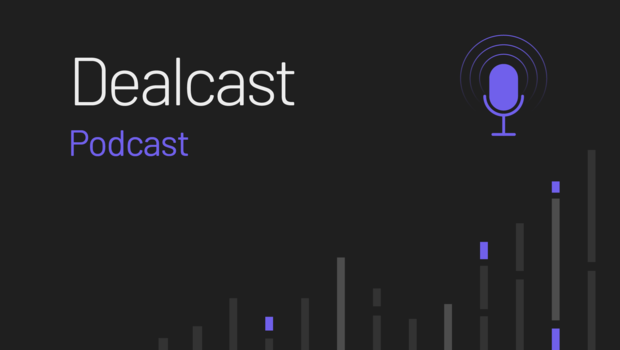Podcast: Australia's COVID-19 Pandemic Upending M&A From a Stakeholder Perspective
6 May 2021
Australia's COVID-19 impact on M&A deal activity and ESG investing
Simon Segal, editorial consultant and director for Mergermarket Australia, joins Julie-Anna Needham to discuss Australia’s COVID-19 impact on M&A deal activity, changes to shareholder involvement and ESG investing in this week’s episode.
In this podcast, you’ll hear about:
- Australia's early success battling COVID-19
- How the pandemic has affected M&A
- The role of ESG in investor decisionmaking
Transcript
[MUSIC PLAYING] JULIE-ANNA NEEDHAM: Welcome to Dealcast, the weekly M&A podcast presented to you by Mergermarket and SS&C Intralinks. I'm Julie-Anna Needham. This week, we're looking at Australian M&A and how the COVID-19 pandemic is shaking up M&A from a stakeholder perspective. Joining me from Sydney is Editorial Consultant and Director of Mergermarket on Australia, Simon Segal. Hi, Simon.
SIMON SEGAL: Hi, Julie-Anna.
JULIE-ANNA NEEDHAM: Thanks for joining me. So can you begin by giving us an introduction to the impact COVID-19 has had on the corporate world in Australia? From our perspective, from my perspective in the U.K., it looks like a country that's got off quite lightly with the pandemic.
SIMON SEGAL: So Australia's achievement has been remarkable in both combatting it, by keeping the virus out, and in controlling the virus out from foreign influences. The borders are virtually dead closed and which has made a huge difference. And internally, the tracking and the tracing and the sophistication of the monitoring mechanisms have kept the hospitals. And they've kept the virus out of the domestic population as well. This have been just over 900 in total, which is really remarkable in a global context. And that's what was in one day's worth of what's even happening in the United States today even at the lower levels.
And Bloomberg does an index that looks at the achievements of the coronavirus, and Australian's ranked, when I last looked I think on the 26th of April, it's ranked third. And that's a whole collation of how they look at those achievements.
What's happened in Italy is there's been a bit of difficulty with the vaccination program. And the government, after having huge coordinates -- not only the government, the Civil Service, the whole the entire bureaucracy -- what's happened now is that there's comeuppance on the vaccination rollout.
And Australia's only just had 2 million vaccinations out of a population of 25 million. So that's proving a problem. It has ramped up over the last week dramatically again. And their initial problem, they are way behind their initial targets. Initial promise was to vaccinate the entire population by end-August. This looks like going well into next year.
But having said that, the argument is that they can afford to get best practice on the vaccination, and there's no rush. There's no rush to get it out. There is no disease really in effect. There is no coronavirus in the country other than in the centers that hold the foreign people who come from offshore.
JULIE-ANNA NEEDHAM: And what about the impact of COVID-19 on the corporate world? And how has that affected M&A?
SIMON SEGAL: M&A has been intricately connected across the whole range of stakeholders through the coronavirus. As a start, the boards and managements, corporate boards, financial advisors have had huge difficulty valuing deals, both as a target and as a better side. They've had huge deals negotiating and coming together to negotiate deals that have had huge complications conducting due diligence. A lot of the facilities have been shut, and there's no direct access. So that's made both the valuation and the process hugely difficult.
Having said that, there is now a boom in Australian M&A over this past first quarter. It did slow down initially. M&A activity slowed down dramatically. This time last year, it's, for all intents and purposes, following global trends. It [INAUDIBLE] People really didn't know what was looking ahead of them.
There's a lot more confidence now, especially in Australia. There's even further confidence, given my earlier comments about the confidence that the Australian public and the corporate world has in the impacts that corona has been controlled in Australia. So that confidence has buoyed activity, has buoyed sentiment. There's a strong equity market at the moment. And it's very, very buoyant at the moment. So that's from the boards' and the advisory perspective.
From shareholders' perspective, there's a multiple process going on. And certain shareholders have taken activist positions, more so than they would have in the past. In terms of if those are the shareholders investment, they seem to have been emboldened. It started-- it was a notorious deal that you wouldn't have heard of-- well, not personally, wouldn't have, but few of the listeners would have heard of, with MetLife UK, which is a life insurance company.
Again, this time last year, they never bid from a private equity group. As a Swedish origin, part of a private equity group is ESG. To cut a long story short, ESG, the corona pandemic hit, ESG pulled out, and shareholders really got annoyed about that. And at the end of the day, remarkably, despite a material adverse change clause is probably being breached, they renegotiated and cut terms so shareholders didn't lose everything.
So that was just the flavor of what was to come. And we've seen endless positions since then, where shareholders are in effect much more influential than they've been in the past in influencing the board's decision, how to handle the talk and approaches.
JULIE-ANNA NEEDHAM: What else has prompted this change in approach by shareholders?
SIMON SEGAL: Well there are a few factors. Firstly, they were, initially, when the concern was that bidders would just come in at any price. The weakest were going first, were being bid first. The weakest companies and shareholders didn't realize that at the bottom of the cycle, they weren't wanting to be bid at a really low price and the boards just to capitulate at that level. And then just, given the board, and just giving value to leave a lot of value on the table.
So shareholders made that clear. And they stood firmly behind the board. That could have happened both ways. And subsequent to that, shareholders are now emboldened by the equity valuations. So they seem to think, that is being arrived is the forecast for economic growth for future and equity prices, despite being highly valued, is still buoyant. So they are playing on that sentiment as well. And they don't want, particularly private equity, they don't want them knocking on the doors, walking away with them and with a lot of value left on the table from their perspective.
JULIE-ANNA NEEDHAM: And can you give us some more examples of deals where you've seen those high equity values?
SIMON SEGAL: At the moment, there are a good few companies being bid, where shareholders have, in effect, forced the companies to restructure into take embrace at targets. Tabcorp at the moment, which is a huge gaming company, has just recently announced a demerger program. And that was due to shareholder pressure. And that's now going-- they've managed, an initial bidder has now already improved its price by close by 1500%, given that their shareholders stood firmly by the board.
And another company, a well-known casino company in Australia, Crown Resorts, similarly, they've had huge trouble with in terms of their corporate governance, that's another tale, but they similarly all running a process now. And shareholders are sticking by them. And these are the non-controlling shareholders that's been a governance issue with the controlling shareholder and James Packer. And so those are two huge companies at the moment.
JULIE-ANNA NEEDHAM: Yeah, we looked at Crown a few weeks ago. And I spoke to your colleague, Stephanie Hanna. So what do you say that shareholders are just generally becoming more assertive in these types of situations?
SIMON SEGAL: Yes. They absolutely are. And targets would always say, shareholders are assertive. Yes, I would say that. Wouldn't they-- that this is an undervalued bid. But there's a difference in the tone of what's going on now, and the emphasis and the ability to get bumps and to get share price bumps. And yeah, [INAUDIBLE] was another company but that had a huge bump. Village Roadshow had a huge bump from shareholder pressure. Yeah, there are numerous examples to share with that's happened.
Beyond it, it's always happened. Obviously, shareholders have always wanted more value than bidders are prepared to offer. And there's always been that [INAUDIBLE] to and fro. But the emphasis now -- they seem to be a bit more successful. And it's much more dominant boards are much more cautious about backing them, about securing their shareholder mandate behind them.
JULIE-ANNA NEEDHAM: Thank you. And just changing tack slightly to an issue, which I know is very close to your heart, the role of ESG. I'm interested in how much ESG plays a part in Australian investors decisionmaking. There's been a huge trend towards a focus on ESG, a global trend towards ESG issues. Is that something you see reflected in Australia, which is obviously a country with a huge reliance on a Mine Inc.?
SIMON SEGAL: Very much so. Australia, it might be lagging, particularly European trends, maybe not in the United States. But there's been very high profile incidents, as we've mentioned, and IMB, there was a banking commission of inquiry into the financial services sector. And that's led to a lot of reform amongst the banks. In terms of and they've been followed up in an M&A activity certainly resulting from those divestments, from those assets, from those weaknesses. And is being huge. There's a lot of emphasis perhaps, again, not as much as with as in Europe, but a lot of emphasis from the big super funds, which are the retirement funds in Australia.
On ESG issues in their mandate, Australian super funds are heavily influenced by trade unions, by their members, by trade unions. So those ESG issues are increasingly coming to the fore. And they will be, particularly on issues like climates and corporate governance, the probity issues, perhaps, not some not quite on as extensive as one would think in terms of suppliers and customers, but I suspect that that will come for the entire gamut and also employers. Employers still aren't at the forefront, but I assume, one can reasonably assume that that will happen.
The coronavirus pandemic as-- the questioning of the market economy has become much more vociferous and much more loud with the coronavirus pandemic, with the sustainability and the desirability of a market economy is under pressure.
JULIE-ANNA NEEDHAM: And looking at the intersection of the two topics we've covered, the ESG and M&A, how much of a factor is ESG in M&A deals?
SIMON SEGAL: It's increasingly going to become a factor. So in a few ways, the first way, I made mention earlier of these super funds. And they are the big investors, and they're actually doing the investments themselves now. And their mandates are increasingly taking those concerns of the environment and governance. And that can be expected to directly impact investment choices that bidders make. And investment choices, their targets make, in terms of who they choose as a bidder, or they don't choose bidders, or that they might choose it, if it's an auction process.
And so that's very much to the fore. But there's also a lot of need to address regulatory concerns. And in particular, foreign investment, that's increasingly being linked to national security and, ultimately, broader and, perhaps, not pure ESG issues but pretty close. Some of them would embrace ESG issues. And on the antitrust issues, it's the same. It would be the same concerns. And through the regulators, they would absolutely be. There's much more need to satisfy their concerns, of which are not competitor now increasingly ESG issues.
JULIE-ANNA NEEDHAM: That's great. We'll leave it there. Simon, thank you very much.
SIMON SEGAL: Thank you.
[MUSIC PLAYING]
JULIE-ANNA NEEDHAM: That was Simon Segal joining me from Sydney. Thank you for listening to this week's episode of Dealcast, presented by Mergermarket and SS&C Intralinks. Please rate, review, and subscribe to the podcast. You can find us on Apple Podcasts, Spotify, or look out for your Mergermarket news alert. For more information, check out our show notes. Join us next week for another episode.
[MUSIC PLAYING]


